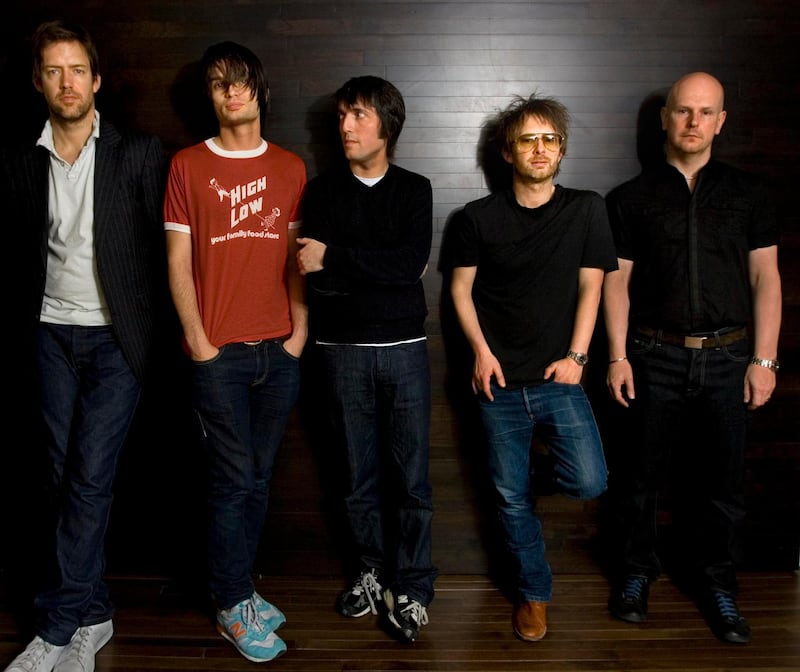The internet was supposed to set us free. To break the hegemony of media moguls, corporate interests and entertainment empires that monopolised what we saw, heard, ate and bought. But while we now enjoy unprecedented access to a diversity of voices, the mechanisms by which they reach us are worryingly centralised. Forget local shops, radio stations or newspapers; technology dictates that books be bought on Amazon, movies watched on Netflix and music streamed on Spotify – all that opinion-shaping power seized by a few superstate-sized tech giants.
It's a troubling reality, and artists, creatives and, especially, musicians have had little choice than to play along. While a performer's success used to be at the mercy of record companies and fickle media programmers, artists now sacrifice their once-principal revenue source – music – to streaming and video platforms to gain the exposure they need to tour and sell merchandise.
Which is why the Radiohead Public Library is such a fascinating project. As one of the world's biggest rock bands, the irascible British quintet are uniquely placed to employ tech to reclaim their own legacy, deciding how their work will be consumed in a way that would have been impossible before the internet – but feels distinctly against the grain in the Instagram age. "This project is a great example of artists taking back control!" tweeted Future Radio's Slab City radio show, shortly after the January 20 surprise unveil.
https://t.co/Gk4BUXwjsg has always been infuriatingly uninformative and unpredictable. We have now, predictably, made it incredibly informative.
— Radiohead (@radiohead) January 20, 2020
We present: the RADIOHEAD PUBLIC LIBRARY. pic.twitter.com/H7Ft6lNuuN
And it's very on-brand for Radiohead, whose members have blasted Spotify's "unfair" reimbursement model. In 2013, singer Thom Yorke called the Swedish streaming giant "the last desperate fart of a dying corpse" after pulling a solo album from the platform.
Despite the twee conceit of allowing users to download their own personalised library card photo ID, to be printed out at home, the Radiohead Public Library is, in essence, only a website. It arrives at a time when the very idea of a website feels antiquated – who has time for homepages when there are newsfeeds to scroll? – and from a band who always took an apparent pride in their irritatingly inconsistent online presence. "Radiohead.com has always been infuriatingly uninformative and unpredictable," read the band's own Twitter post, announcing the project. "We have now, predictably, made it incredibly informative."
That's no exaggeration, because this website is nothing less than a treasure trove of material. It collects not only all Radiohead's officially released music and videos in one place – much of it previously unavailable online – but also hours of live footage from across the group's 28-year recording history, exclusive artwork, promo clips, TV appearances, forgotten webcasts, curated playlists, print-era fan club newsletters and other curios which, collectively, will take die-hards weeks to fully absorb.
"It's endless when you start looking," tweeted guitarist Jonny Greenwood, when it was his turn to play "librarian" in a daily series of band-curated intros designed to ease users in.
It's the latest delightful twist in the band's historically complicated digital relationship with fans; in 2016 Radiohead deleted all their social media accounts and closed their website before releasing A Moon Shaped Pool, while almost a decade earlier, 2007's In Rainbows was famously self-released online as a pay-what-you-want download, a rally against then-prevalent internet piracy.
"Radiohead have always been trailblazers in the way their art has been distributed and consumed by the public," says Shadi Megalla, the UAE-raised DJ, promoter and owner of The Flip Side, the pioneering vinyl shop in Dubai's Alserkal Avenue. "I'll never forget when they self-released their In Rainbows album digitally and gave fans the option to pay what they wanted, even if it was nothing. This move challenged the industry, but more importantly raised the question: 'what is music worth?'
“I’ve got the utmost respect for Radiohead’s methods and for taking charge of their own narrative and continuously moving forward when it seems like there is nothing left for them to prove.”
The library is ordered in nine colour-coded sections, each housing material from a different album-shaped chapter in the band's development. For example, the section dedicated to A Moon Shaped Pool contains a total of 10 full-length pro-shot live concert films dating from 2016 and 2017, as well as related tracks such as the rejected Bond theme, Spectre, official videos, intimate secret garden performances, several artsy interpretative clips, a tongue-in-cheek vinyl unboxing clip and seasonal band-curated playlists of other acts. Notoriously preoccupied with controlling their own image, one only wonders what Radiohead left out. And, yes, there is a commercial aspect – each chapter includes a selection of associated-era T-shirts now available to buy, many for the first time in years.
"They're a band that likes to be at the forefront of technology and innovation, so in that sense it doesn't surprise me they'd do something like this," said Daniel Marr, a project manager at the UK's largest audio equipment firm, SSE Audio, and a member of longtime underground rock band Rhyn. "They do benefit from already having a huge following, though – in that sense they're already in a better position to be able to do the innovative things than any smaller or newer band would be.
"It's very easy to do things your own way when you have a loyal following of millions who will lap it up no matter what. If you're a new band you can often end up reliant on the streaming services and YouTube to get anyone to hear your music at all, even if you don't really like the idea of streaming."
Crucially, visitors always remain within the library's own infrastructure, with the bulk of video content self-hosted, while third-party material already on YouTube is seamlessly embedded and never interferes with the holistic user experience. Only the music itself is out-linked to Spotify or Apple Music, but in typically petulant style, or the band's disowned juvenile debut Pablo Honey, it only includes a link to buy the CD – despite it being available to stream on the platforms themselves. It's even officially on YouTube, where Radiohead last month took the curious step of officially posting all their albums in full, in a perceived swipe at Spotify.
"I think the issue of online copyright is very interesting – they seem to have a bit of a contradictory stance: hate Spotify but uploaded their catalogue to YouTube," says Kathleen Hall, a tech and AI writer at the UK's Bureau of Investigative Journalism. "I guess this is a way of taking ownership of the platform – beyond that, the library is a cool way to get access to your nerdy T-shirts from the '90s and '00s."

If Radiohead's library has any precedent, or better, it's the Neil Young Archives, which went live in 2017. An offshoot of the idiosyncratic Canadian rocker's contrary nature, it centralises his 50-plus albums – including dozens of unreleased LPs – in a single location, as well as movies, videos, photos and press clippings, and offers exclusive content such as concert live-streams and a rambling self-penned blog. Its greatest improvement on Radiohead's library is that all the audio is kept in-house, played at a far higher quality than via Spotify – but users have to pay for it, with most of Neil Young Archives open only to subscribers prepared to commit $1.99 (Dh9.50) a month for access.
Whether Radiohead have any plans to monetise their site remains to be seen, but as well-known Young fans, Radiohead Public Library was probably inspired directly by Young's own earnest self-chronicling. Taken together, these resources from two of the world's most uncompromising rock acts surely represent only the beginning of an emerging wave of artists intent on taking back control of their work in the digital age.






